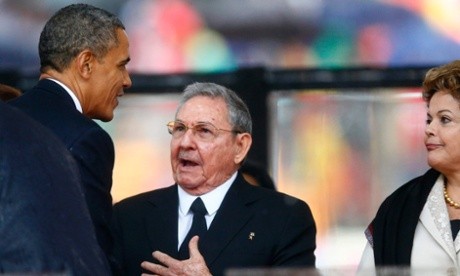(VOVworld)- The US and Cuba have decided to normalize their ties for the first time since 1961. The historic announcement, made by Cuban and US leaders on Wednesday, has been applauded by the world community. It opens a new chapter in the two countries’ relations.
December 17, 2014 has become a historic milestone in the stormy relationship between Cuba and the US for the past half century. Cuban President Raul Castro and US President Barak Obama announced a decision to re-establish diplomatic ties, paving the way for the normalization of all bilateral ties.

President Raul Castro (second, left) and his US counterpart Barack Obama (first, left) at the funeral of late South African President Nelson Mandela (Photo: Reuters)
|
First steps in normalizing bilateral ties
Three Cuban intelligence agents detained in the US were returned to Cuba on December 17 in exchange for a US national Alan Gross, and a spy serving the US government, who was detained by Cuba 20 years ago. The US plans to open an embassy in Havana in the next few months. President Obama promised to talk to the US Congress about removing the trade embargo against Cuba and said he has assigned Secretary of State John Kerry to talk to Cuba about further steps to normalize bilateral relations.
Public applause
The world public has long awaited the normalization of US-Cuban diplomatic ties. The historic decision on December 17 has been widely applauded by American politicians, scholars, businessmen and others. They hailed President Obama’s roadmap for normalizing ties with Cuba, which will serve US interests in the Western hemisphere and around the globe. Cuban leaders stressed that Cuba has never been a threat to US security and that Havana is ready to establish a win-win relationship with Washington on the basis of equality and mutual respect in line with international law and the UN Charter.
The normalization of the US-Cuban relationship has been widely applauded by the world community. UN Chief Ban Ki Moon praised the historic decision saying that the United Nations stands ready to help both countries cultivate good neighbor relations.
Pope Francis welcomed the US and Cuba breaking the ice in their bilateral ties. Mateo Estreme, the UN Deputy Representative of the Common Market of South America (Mercosur) said US sanctions have caused serious damage to the Cuban people and held back progress in realizing international development goals and that the US embargo against Cuba is an example of outdated policies in the current context.
An outdated policy
The relationship between the US and Cuba has been frozen since the Cuban revolution in 1959. Since Cuba deposed former dictator Fulgenci Batista and set up the Cuban Socialist State, the US has imposed sanctions and an embargo against Cuba.
The US embargo against Cuba has caused a loss of more than 1.1 trillion USD. Cuba’s tourism sector, one of Cuba’s hard currency earners, suffered the biggest loss. The US embargo against Cuba has also caused losses for many other countries. Banks which have conducted transactions with Cuba have been fined by the US more than 11 billion USD. The US isolation policy against Cuba has been denounced by several countries. In a televised speech on December 17, President Obama said Washington's current approach was "outdated" and the announced changes were the "most significant" changes in US policy towards Cuba in more than 50 years. He said the changes would bring the two countries closer together and help re-establish mutual trust toward a more stable and sustainable future. The normalization of US-Cuban ties is evidence of the two countries’ determination to hold dialogues, but it’s just the start of a long path ahead with a lot of challenges that need to be addressed. The normalization of US-Cuban ties still needs the approval of the US Congress. But the historic decision by the two countries’ leaders marks a turning point and has met the two peoples’ aspirations.